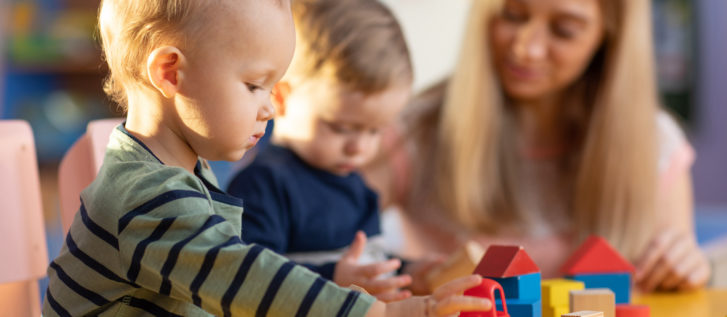
Atom Bank: making a success of the four-day week
Atom Bank is a digital-only bank and part of the upcoming challengers in the fintech...read more
Natalie Trice had a busy career in PR. She had worked for Sense, the charity for deaf and blind people, as well as the Earthwatch Institute and Cartoon Network where she was covering Europe, the Middle East and Africa. Her life changed totally when she became a mum.

The family moved out of London. Natalie had imagined being a stay at home mum, but found she missed work too much. “It was a real turning point for me when I realised that I needed something in addition to being at home,” she says. “I found maternity leave really hard, doing something I could not control, and I really grieved for the life I had before.”
She returned to work as a freelance. Soon after her second son Lucas was born. Natalie says he had “clicky hips” when he was born, but he was not diagnosed with Developmental Dysplasia of the Hip [DDH] until later. DDH is a problem with the way a baby’s hip joint forms before, during, or after birth — causing an unstable hip. In severe cases, the hip joint can dislocate or cause trouble walking.
Natalie, whose sister has DDH, pushed for Lucas to have an early check-up. He was put into a harness which didn’t work. The family decided to go private and were told Lucas needed surgery. Natalie knows now of people who are not diagnosed until much later and says the effect can be devastating because by then the condition is much worse and hip replacement operations are often required.
Lucas had his first operation when he was just nine months old and was in a cast for six months. He has since had several episodes of being in a cast or brace. After his second birthday he was in an almost full-body cast for four months. He suffered post-traumatic stress and became mute for a while. Natalie speaks of the difficulty of seeing her son basically “incarcerated in a cast”. At the same time as trying to help Lucas, she was also dealing with an older toddler. She says the stress put pressure on her marriage and in the end she was forced to give up her freelance business for a while. “It is extremely stressful seeing your baby be broken and remade and to have to keep doing it without it breaking you,” she says. “It was not the motherhood I had imagined.”
It was not just the operations and aftermath, but the day to day practicalities of living with a child with DDH. Natalie had to carry Lucas in a certain way. She couldn’t lift him under the armpits. It was exhausting physically and emotionally. She lost friends. She recalls people trying to console her that ‘at least it wasn’t cancer’, but says, although well meaning, that ignored the huge toll Lucas’ condition took on the whole family.
Support for parents
Natalie began blogging about Lucas and started a writing course. She was intending to write a book about mums at the school gate, but her tutor suggested that instead she write about Lucas. So she did. Her book aimed to help other families who had children with the condition, giving them a voice and practical advice whatever their circumstances. Natalie had been acutely aware that her family were lucky to be able to afford to get a private doctor’s diagnosis. She was very keen to give something back to other families who were struggling.
She sent the book to an editor. The week after Lucas was told one of his legs was growing faster than the other and he would have to have his pelvis broken. He was six years old at the time. Natalie was forced to change the end of her book which had been fairly upbeat.
She launched the book, Cast Life: a Parent’s Guide to DDH, three years ago, at the same time as her charitable trust, DDH UK. The launch took place just two days before Lucas underwent another major operation and got lots of publicity.
Natalie describes the operation as “horrific”. Lucas was in hospital for a week and then had to be carried around for three months. “It seemed like this was a never-ending nightmare,” says Natalie. Her experience made her even more determined to help others through her charity, which provides a 24/7 support network via Facebook. “A lot of parents says they could not cope without the charity,” she says.
Natalie’s work on behalf of parents of DDH children has resulted in media exposure and invitations to give her views on issues related to DDH. For instance, she has been invited to speak at the Royal College of Surgeons conference next year.
She still contributes every day to her charity’s Facebook page, but has delegated the answering of parents’ questions to the community of volunteers she has built up around the world as she realised she could not take on everything.
Devon
Two and a half years ago the family moved to Devon. Natalie got the flu and her immune system shut down. She was ill for three months and then started suffering from vertigo. Things have got a little easier since, although Lucas still needs more surgery. Natalie has been able to restart her freelance PR work, re-establishing her contacts and building her network. Lucas is thriving at his new school and Natalie says he has become very resilient after having more surgery in his first few years than most people have in a lifetime. The family has also become closer as a result of what they have been through.
Natalie has written a second book on PR for women who have given up corporate careers and has set up her own Facebook PR school, giving people the tips of the trade.
She says her family’s experience with DDH “has totally changed the course of our lives” and her career. “I am not where I thought I would be in my career,” she states, “but I have two happy kids, we are living by the sea and I have the feeling that I am doing something positive for others.” That desire to make a difference to others is a huge motivating factor. She says: “I remember crying on the kitchen floor when Lucas was a baby. Parents need more information and for it to be delivered free of jargon. I want to make sure my child is OK, but also to help other people.”

A new report from the Fawcett Society says access to the free hours childcare scheme should not be exclusively for those working or those working over... read more

Sure Start centres which were well resourced and locally embedded, able to do outreach work to parents, have had an impressive impact. We need to... read more

Academics advising Working Families have made five recommendations to address the barriers facing working parents, from boosting Universal Credit to... read more

Parents say savings from the 15 hours of 'free' childcare for two year olds are being diminished by fee rises, according to a Pregnant Then Screwed... read more